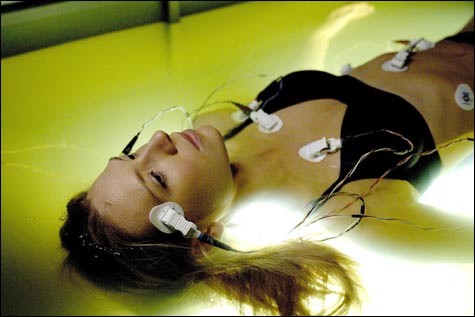
BOSTON BUMMER: And a plane full of dead and decomposed people at Logan is just the beginning. |
There’s a moment during the two-hour pilot of Fringe (Fox; Tuesdays at 9 pm), the new science-fiction series from creator J.J. Abrams (the man responsible for Lost and Alias), in which Dr. Walter Bishop, a mostly mad scientist, describes a procedure by which two people can share the same dream. It’s the kind of thing that can help an investigator get an eyewitness account from someone who’s in a coma, even if said procedure is basically just a high dose of hallucinogens. “It’s not an exact science,” Dr. Bishop says. His wise-ass son Peter (Dawson’s Creek’s Joshua Jackson) interjects: “It’s not even science.”
Peter’s sledgehammer subtlety make it clear, if you hadn’t already guessed, that Fringe will deal with some things that are, well, a little strange. The first episode introduces us to Olivia Dunham (Anna Torv), an FBI agent who’s called in when a plane lands at Logan Airport and every passenger on board is found dead and decomposed. After further research, Olivia learns about the experiments of Dr. Bishop in the field of “Fringe Science” and concludes that he might be able to help with the investigation. But he’s been institutionalized, and only immediate family can visit him, so she has to locate his estranged genius son Peter. Even though Peter has a poor opinion of dad, he doesn’t require much convincing to play along, and soon Dr. Bishop is sprung. The case gets solved, and a higher-ranking fed, Phillip Broyles (Lance Reddick, who played Daniels on The Wire), offers Olivia a job working for him to unravel even stranger mysteries.
In interviews, Abrams has said that he’d like Fringe to play a little different from Lost — he’s suggested that Fringe episodes will stand on their own without necessarily advancing the show’s larger plot arc. The hope is that viewers can jump in without being up to speed on every episode. Although this strategy worked for sci-fi cult favorites Buffy the Vampire Slayer and The X-Files, it carries some risk here. Without the long-form storytelling, Fringe boils down to a procedural.
Which means success will hinge on how interesting each case is. The open files Broyles mentions at the end of the pilot sound promising, and the show’s strange science opens the door for some creative police work, but there’s still the inherent risk of formula. You can picture it now: Olivia snags a case, brings it to the Bishops, Walter comes up with a bunch of theories, Peter dismisses them all, there’s a red herring around the 30-minute mark, Broyles yells at them, and then, just as all hope seems lost, they have a breakthrough and solve the case. Torv isn’t bad, but the Bishops are far more interesting. And Phillip Broyles hardly touches Reddick’s considerable talents; I’d have rather seen his role on Lost become a full-time gig.
Fox is giving Fringe every opportunity to succeed: it gets House as its lead-in during the fall and then the coveted post–American Idol time slot in January. Which means the writers will have time to get everything figured out. The show needs some work before it can justify the comparisons with The X-Files. (And it doesn’t even belong in the same paragraph as Twin Peaks at this point.) But hey, this television thing isn’t an exact science. It’s not even science.